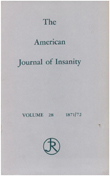Stressful life events, genetic liability, and onset of an episode of major depression in women
Abstract
OBJECTIVE: This study was undertaken to clarify how genetic liability and stressful life events interact in the etiology of major depression. METHOD: Information about stressful life events and onset of major depressive episodes in the past year was collected in a population- based sample of female-female twin pairs including 2,164 individuals, 53,215 person-months of observation, and 492 onsets of depression. RESULTS: Nine "personal" and three aggregate "network" stressful events significantly predicted onset of major depression in the month of occurrence, four of which predicted onset with an odds ratio of > 10 and were termed "severe": death of a close relative, assault, serious marital problems, and divorce/breakup. Genetic liability also had a significant impact on risk of onset of depression. For severe stressful events, as well as for 10 of the 12 individual stressful events, the best-fitting model for the joint effect of stressful events and genetic liability on onset of major depression suggested genetic control of sensitivity to the depression-inducing effects of stressful life events. In individuals at lowest genetic risk (monozygotic twin, co- twin unaffected), the probability of onset of major depression per month was predicted to be 0.5% and 6.2%, respectively, for those unexposed and exposed to a severe event. In those at highest genetic risk (monozygotic twin, co-twin affected), these probabilities were 1.1% and 14.6%, respectively. Linear regression analysis indicated significant Genotype by Environment interaction in the prediction of onset of major depression. CONCLUSIONS: Genetic factors influence the risk of onset of major depression in part by altering the sensitivity of individuals to the depression-inducing effect of stressful life events.
Access content
To read the fulltext, please use one of the options below to sign in or purchase access.- Personal login
- Institutional Login
- Sign in via OpenAthens
- Register for access
-
Please login/register if you wish to pair your device and check access availability.
Not a subscriber?
PsychiatryOnline subscription options offer access to the DSM-5 library, books, journals, CME, and patient resources. This all-in-one virtual library provides psychiatrists and mental health professionals with key resources for diagnosis, treatment, research, and professional development.
Need more help? PsychiatryOnline Customer Service may be reached by emailing [email protected] or by calling 800-368-5777 (in the U.S.) or 703-907-7322 (outside the U.S.).



